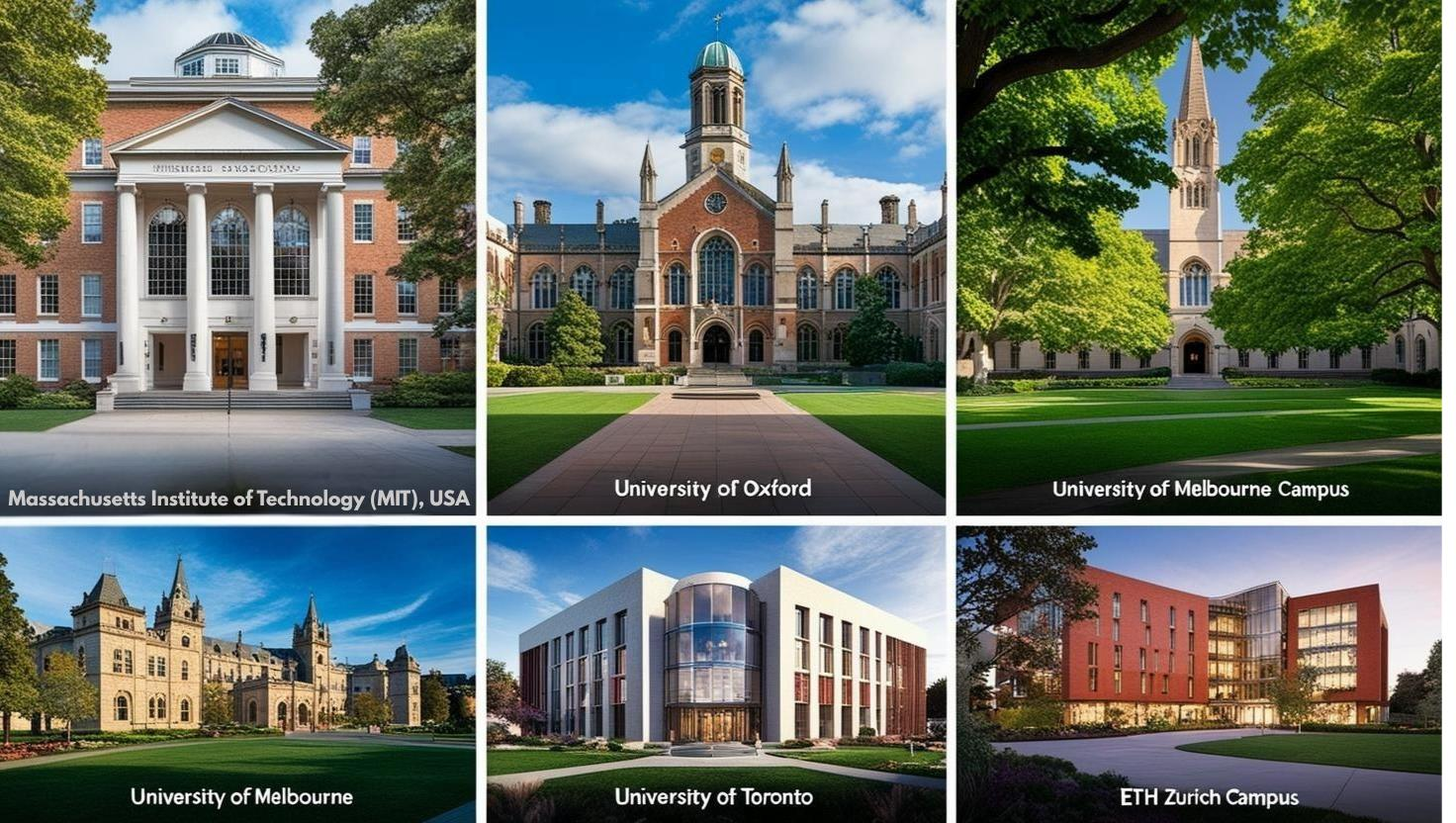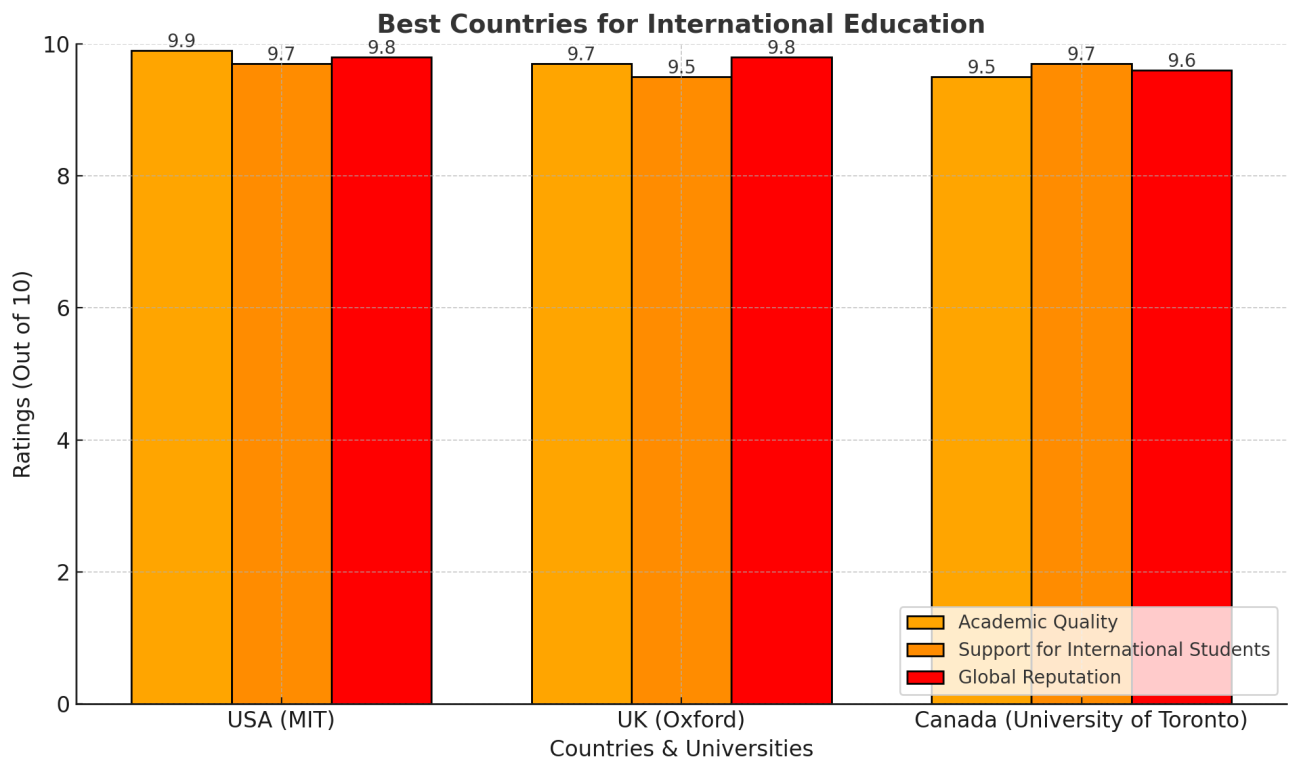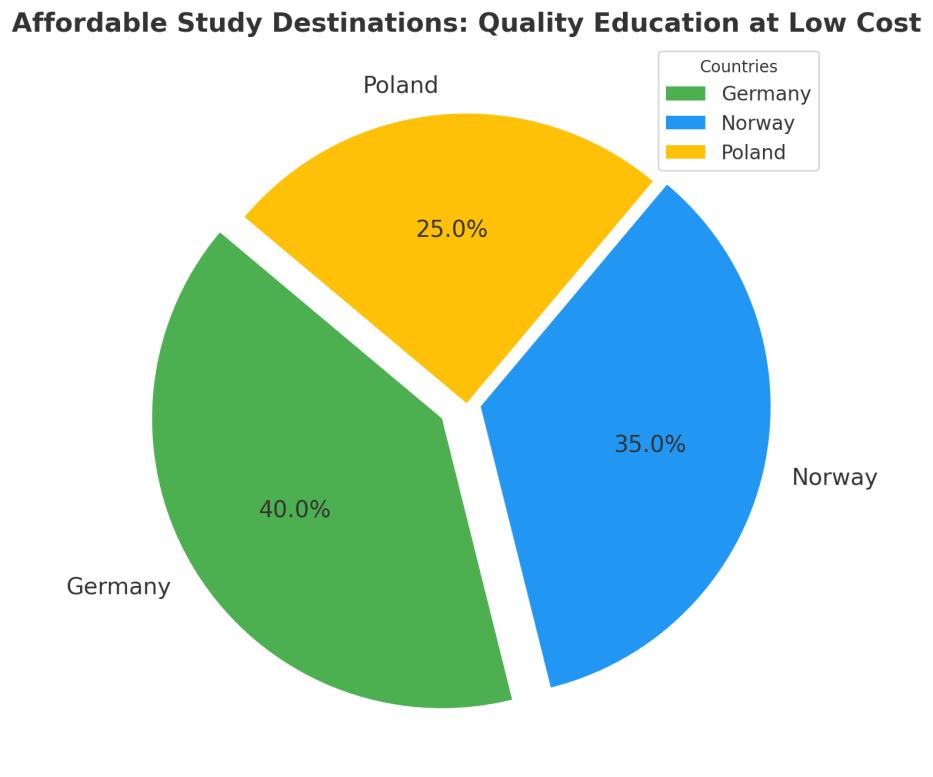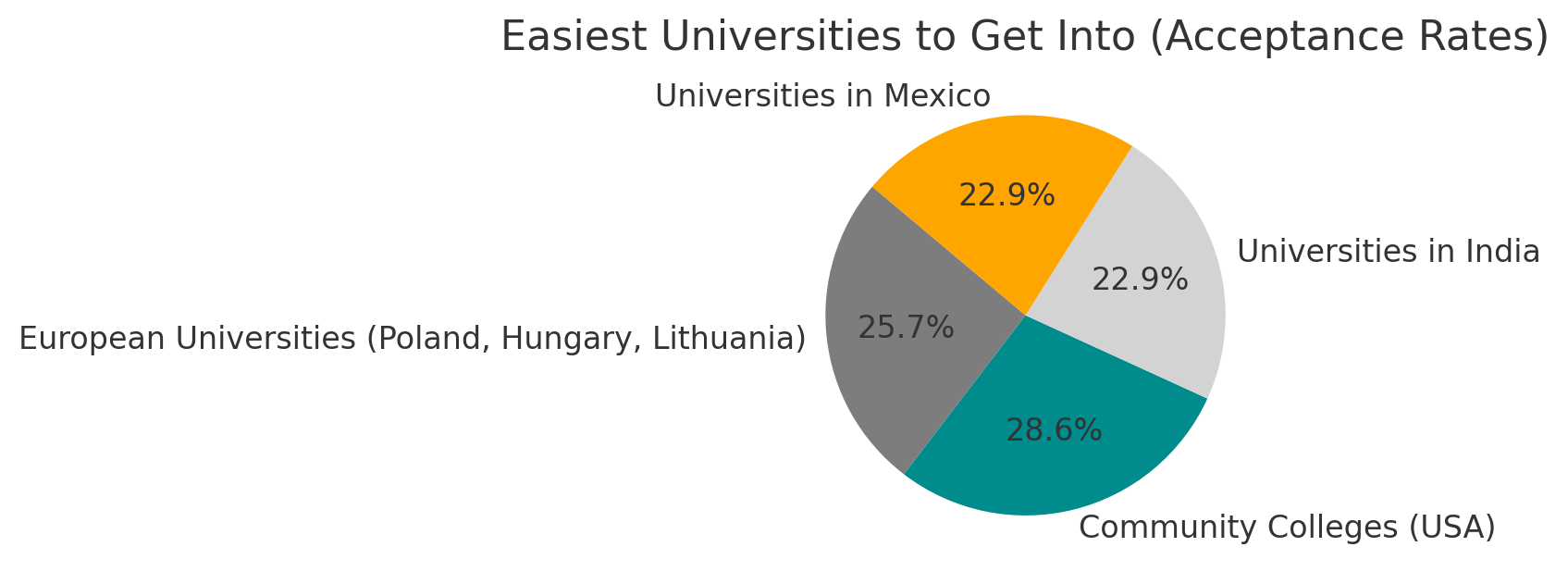
Picking the right university as an international student is a huge decision. The options can feel endless. You want a school that offers quality education, safety, and affordability. You also want a place that values cultural diversity and provides solid post-graduation opportunities. This guide breaks down the best universities, countries, and programs for international students. It’s all about finding the right fit for your education abroad.
Top Universities for International Students
Some universities stand out for their strong academic programs, welcoming environments, and resources for international students. They offer top-notch education while also providing cultural support, language programs, and career guidance.
Here are some of the best universities known for supporting international students:
Massachusetts Institute of Technology (MIT), USA
MIT consistently ranks as one of the world’s top universities. It offers a range of programs in technology, engineering, business, and more. International students make up a significant portion of the student body, and the school provides dedicated resources to help them adjust and succeed.
As one of the oldest and most prestigious universities, Oxford attracts students worldwide. It’s known for its rigorous academic environment and impressive research opportunities. The school offers several scholarships specifically for international students.
University of Melbourne, Australia
The University of Melbourne is a popular choice for international students seeking high-quality education in a culturally vibrant city. It provides excellent support services, including academic counseling, career advice, and social integration programs.
This top Canadian university is highly regarded for its research programs and diverse student population. Toronto is also one of the most multicultural cities in the world, making it a welcoming environment for international students.
Known for its strength in science, engineering, and technology, ETH Zurich offers a rigorous education and access to cutting-edge research facilities. Switzerland’s high quality of life and safety make it an attractive choice.
These universities are just a few examples. They stand out not only for their academic reputation but also for their dedication to helping international students succeed. Programs like orientation sessions, mentorship, and career support make them appealing options for students worldwide.
Carlos, a student from Brazil, chose MIT for his undergraduate studies in engineering. During his first year, he joined the international student mentorship program, which paired him with a senior student who guided him through academics and campus life. The cultural exchange events organized by the university helped him feel welcomed and connected with fellow international students.
Best Countries for International Education
Choosing the right country for your studies is as important as selecting the university itself. Factors like academic quality, cultural experience, affordability, and safety play significant roles in this decision. Here's a detailed look at some top destinations for international students:
United States
Home to many of the world’s top-ranked universities, including MIT, Stanford, and Harvard.
Offers a wide range of programs in every field, with strong support systems for international students.
Hosts over 900,000 international students annually.
Optional Practical Training (OPT) allows international students to work after graduation.
Cultural diversity and large international student communities across most campuses.
United Kingdom
Known for academic excellence and historic institutions like Oxford and Cambridge.
Offers one-year master’s programs, making graduate education more affordable and time-efficient.
Many universities offer scholarships for international students.
Post-study work visas allow graduates to stay and work for up to two years.
Accessible travel to other parts of Europe.
Canada
Known for inclusive immigration policies and high-quality education.
Universities like the University of Toronto, UBC, and McGill rank highly globally.
Multicultural cities like Toronto, Vancouver, and Montreal make the transition easier.
International graduates can apply for work permits and permanent residency.
Tuition is generally lower than in the U.S. or U.K., with public healthcare benefits in some provinces.
Each of these countries offers strong academic institutions and clear pathways for international students to study, work, and build a future. Your choice should depend on your field of study, budget, and long-term goals.

Each of these countries offers unique advantages for international students. When deciding where to study, consider factors such as your field of interest, language preferences, budget, and career goals to find the best fit for your educational journey.
Amina from Kenya always dreamed of studying in the United Kingdom. She enrolled in a master’s program at Oxford University. While the academic pressure was intense, she found relief through the university’s various student clubs and cultural societies. Visiting museums and historical sites during weekends added richness to her experience, helping her appreciate the UK’s vibrant history.
Affordable Study Destinations
Studying abroad can be expensive, but there are countries and universities offering quality education at affordable prices. Whether through low tuition fees, scholarships, or cost-effective living expenses, here are some of the most affordable study destinations:
The top three countries from the list based on affordable education, quality of programs, and international student support:
Tuition-Free Education: Most public universities charge no tuition fees, even for international students.
High-Quality Education: Especially strong in engineering, technology, and natural sciences.
Low Semester Fees: Minimal administrative fees ranging from $200 to $400 per semester.
No Tuition Fees: Public universities offer free education to all students, regardless of nationality.
High Quality of Life: A well-regarded education system with a focus on research.
Specialization: Known for environmental studies and marine sciences programs.
Low Tuition Fees: Programs for international students are priced between $2,000 to $4,000 per year.
Affordable Living Costs: Rent, food, and transportation are much cheaper than in Western Europe.
Cultural Richness: Increasing popularity among international students for its cultural heritage and vibrant cities.

These countries provide excellent opportunities for international students to obtain quality education without breaking the bank. Scholarships, grants, and part-time work options can also help manage expenses.
Ibrahim from Pakistan was looking for a high-quality education at a reasonable price. After researching various options, he chose Poland and enrolled at the University of Warsaw. His total expenses, including tuition and living costs, were well within his budget. With part-time work opportunities and a scholarship, Ibrahim was able to comfortably afford his studies while enjoying life in a new country.
Safety Considerations for International Students
Safety is a top priority for international students when choosing where to study. Factors like low crime rates, political stability, and welcoming communities are essential to consider. Here are some of the safest countries for international students:
The top three countries from the list based on safety, quality of life, and welcoming environments are:
Low Crime Rates: Consistently ranks high for safety, especially in cities like Toronto, Vancouver, and Montreal.
Welcoming Environment: Friendly, multicultural society that helps international students feel at home.
Healthcare System: Accessible and efficient healthcare for students with proper insurance coverage.
High Quality of Life: Clean, safe environment with strict law enforcement and high living standards.
Political Neutrality: Stable political environment contributing to overall safety.
Low Crime Rates: One of the safest European countries, particularly for students.
Low Crime Rates: Extremely low crime rates, even in major urban areas like Tokyo, Osaka, and Kyoto.
Cultural Respect: Emphasis on societal respect, safety, and order.
Efficient Public Transport: Reliable, safe transportation systems enhancing overall security.
Safety should be a key consideration when deciding where to study abroad. Choose a country that not only offers a quality education but also a secure and welcoming environment.
Li from China was concerned about safety when deciding where to study. She chose Canada and enrolled at McGill University. The campus felt secure with its round-the-clock security and accessible counseling services. She was also impressed by how welcoming the local community was, making her transition much easier and less stressful.
Admission Competitiveness
Getting into a university as an international student can be challenging, depending on the school’s admission requirements and acceptance rates. While some universities are highly selective, others have more accessible entry requirements. Here’s a breakdown of admission competitiveness:
The top two highly competitive universities based on low acceptance rates and academic reputation are:
Acceptance Rate: Around 4.5%.
Known for excellence in law, business, and the sciences.
Rigorous admissions process requiring outstanding academic records, strong personal statements, recommendation letters, and standardized test scores.
Acceptance Rate: Approximately 4.3%.
Prestigious for technology, engineering, and business programs.
Extremely competitive admissions process aimed at selecting top-tier applicants.
Accessible Universities (High Acceptance Rates)
These institutions are more open to admitting international students, providing broader access to higher education.
Acceptance Rate: Around 80%.
Affordable tuition fees with a growing number of English-taught programs.
Attractive for international students looking for quality education at a low cost.
Czech Technical University (Czech Republic)
Acceptance Rate: About 70%.
Renowned for engineering and technology programs.
Offers affordable tuition and a strong focus on technical education.
Easiest Universities to Get Into (Very High Acceptance Rates)
These universities often have open admission policies or high acceptance rates to encourage international enrollment.
European Universities (Some in Poland, Hungary, and Lithuania):
Acceptance rates can reach above 90%.
Usually, English-taught programs have moderate entry requirements, making them accessible.
Community Colleges (USA):
Open admissions policies make them easy to enter, providing a pathway to transfer to a four-year university later.
Universities in India and Mexico:
Generally less competitive but still offer quality education, particularly in specific fields like engineering and business.

Admission competitiveness can vary significantly based on the country, institution, and program. While prestigious universities are often harder to get into, many reputable schools offer quality education with more accessible admission processes.
Joseph from Nigeria knew that applying to universities like Harvard or Stanford would be incredibly challenging. Instead, he chose to apply to the University of Toronto, known for its high-quality education but with a more accessible acceptance rate. His application was successful, and he was thrilled to study computer science while enjoying the cultural diversity of Toronto.
Value of Degrees from Various Countries
The value of a degree varies depending on where you study and the field of your degree. Degrees from the United States and the United Kingdom are highly regarded worldwide due to the prestige of institutions like Harvard, Oxford, and Cambridge. Employers value the rigorous education and global reputation of these universities.
Germany’s engineering and technical degrees are respected globally, thanks to the country’s focus on practical skills and innovation. Similarly, Canadian degrees, particularly from schools like the University of Toronto and McGill, are recognized for quality and research excellence.
In Asia, Japanese and South Korean universities are gaining global recognition, especially in technology and engineering. Meanwhile, Australian degrees are valued for their focus on research and practical experience.
When choosing where to study, consider how employers in your desired field view degrees from different countries. This can impact job prospects post-graduation.
Lina from Argentina wanted a degree that would be globally recognized. After much consideration, she chose ETH Zurich in Switzerland. With its strong reputation in engineering, her degree helped her secure an internship with a major tech company before even graduating. Lina knew her education would be a valuable asset no matter where she decided to work in the future.
Conclusion
Choosing the best university and country as an international student requires careful consideration of various factors, including academic quality, affordability, safety, cultural experience, and post-graduation opportunities. Each country offers unique benefits, making it important for you to define your priorities before making a decision.
If your focus is on academic excellence and global recognition, the United States and the United Kingdom are top choices. Institutions like Harvard, MIT, Stanford, Oxford, and Cambridge are well-known for their rigorous academic standards and highly regarded degrees. However, these schools can be highly competitive and expensive, making them best suited for students with excellent academic records and substantial financial resources.
For students looking for high-quality education at affordable rates, Germany, Norway, and Poland are attractive options. Germany’s public universities offer low-cost or even free tuition for international students, especially for undergraduate programs. Norway provides tuition-free education for all students, regardless of nationality, although the cost of living can be high. Poland offers a good balance between affordable tuition fees and living expenses, making it a popular choice among international students on a budget.
When it comes to safety, countries like Canada, Switzerland, Japan, and New Zealand are among the safest destinations for international students. They boast low crime rates, political stability, and welcoming societies, creating a supportive environment for newcomers. Safety is particularly important for female students and those traveling alone, and these countries provide peace of mind through their effective safety measures and inclusive cultures.
If you are considering post-graduation opportunities, the United States, Canada, and Australia stand out for their favorable work visa policies. The U.S. offers Optional Practical Training (OPT) for international students, allowing them to work for up to three years in their field. Canada provides a Post-Graduation Work Permit (PGWP) program, which can also lead to permanent residency. Australia offers temporary graduate visas, providing work experience opportunities that can enhance your career prospects.
Ultimately, the best choice for you will depend on your academic goals, financial capacity, and personal preferences. Some countries excel in specific fields—such as Germany for engineering, Australia for research, or the U.K. for humanities—so researching programs that align with your interests is essential.
Studying abroad can be a life-changing experience. Take the time to research your options, compare universities and countries, and choose the one that best matches your needs. The right choice will open doors to academic success, cultural enrichment, and valuable career opportunities.

 How to Pay for College in 2026: Costs, Aid, and Smart Planning
How to Pay for College in 2026: Costs, Aid, and Smart Planning
 The Role of Robotics in Developing Future-Ready College Students
The Role of Robotics in Developing Future-Ready College Students
 Undergraduate Research: How Students Join Labs Across Campus
Undergraduate Research: How Students Join Labs Across Campus
 Using AI to Succeed in College Science Courses
Using AI to Succeed in College Science Courses
 What Steps Should You Take to Become a University Tutor?
What Steps Should You Take to Become a University Tutor?
